 The new algorithm called Google Penguin was announced on 24.04.2012. The update is aimed at decreasing search engine rankings of websites that violate Google’s Webmaster Guidelines by using black-hat SEO techniques, such as keyword stuffing, cloaking, participating in link schemes, deliberate creation of duplicate content, as well as others.
The new algorithm called Google Penguin was announced on 24.04.2012. The update is aimed at decreasing search engine rankings of websites that violate Google’s Webmaster Guidelines by using black-hat SEO techniques, such as keyword stuffing, cloaking, participating in link schemes, deliberate creation of duplicate content, as well as others.
Some of you may notice that your sites lost their rankings. If it happened after 24/04, it is likely that this is the new algorithm. If it happened before, it’s not Google Penguin.
Also check to see whether you have notifications from Google in the “Messages” section in Google Webmaster Tools about spam activity on your website. If so, you will need to take steps to correct the error there.
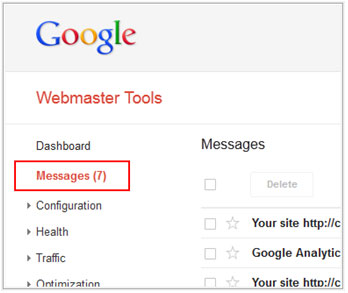
So what does the new algorithm punish and how do you protect your site? In fact, there is nothing new. Google once again tries to make it clear that in order to be ranked high, it is necessary to create “sites for people” and to use only white SEO methods.
There are a lot of articles describing the algorithm in detail, but what I want to stress is how to avoid the angry penguin.
- Do not repeat keywords again and again and have only keywords in your site’s title and description.
Case study:Let’s take a look at the site http://sinfulbuddies.com
The META DESCRIPTION tag of the front page of this site looks like this:<meta name=”description” content=”{%WEB_HOST%} – No strings dating – meet men and women looking for casual NSA relationships ” />These are the words that will appear in the text of the listing of most search engines when you do a search. It is better to have appealing wording there, because this is what your reader will see:
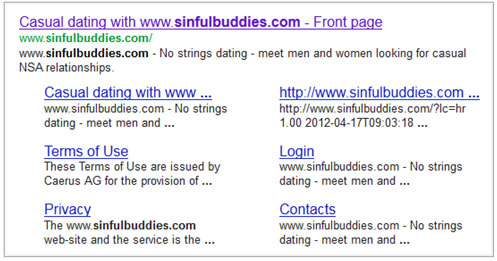
As you can see there is a URL of the site instead of the {%WEB_HOST%} macro.
Considering it – which of the links would you click on if you were looking for a dating site?- No strings dating – meet men and women looking for casual NSA relationships
- Dating site
Make the description interesting and relevant. Call to action. I think it is quite clear that a reader will click on the first link.
The page description should be less than 100 words! - Do not over optimize. Many webmasters are using repeated keywords that result in words and phrase stuffing, which is not acceptable. Google loves to penalize for over optimization.
- Customize your meta tags.
Case study:It would be better if you keep the META tags on every page of your website different. This is a lot of work but it is essential. You should spend as much time and effort thinking of what your visitors are likely to be typing into the search box at the search engines as what you spend on designing your pages.
Some important rules for META tags:- You should not go for more than about 500 characters or some search engines will ignore them or even penalize you for spamming.
- Do not repeat keywords more than three times or you will be penalized.
- Make sure your keywords are relevant to your pages’ content.
You can change the META tags of the internal pages via the Other pages & files section in your admin panel (again: don’t forget to switch the languages if needed):
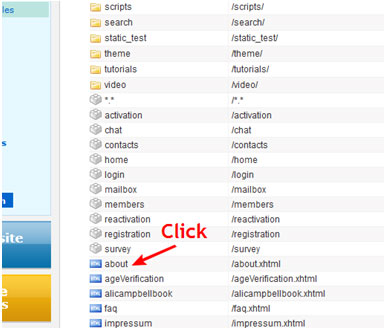
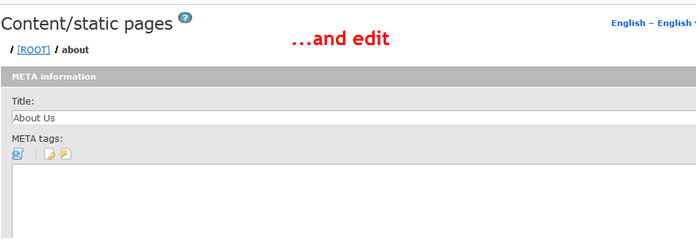
- Create a sensible and attractive title that is readable by humans
Case study:The Title is one of the most important tags. This is the heading people will see in the Search Engines. Be sure to make your Title as interesting and eye catching as possible.
For example, the title of sinfulbuddies.com is:Casual dating with {%WEB_HOST%} – {%PAGE_NAME%}And here is what you can see on a SERP:

As you can see the system replaces the macro {%WEB_HOST%} with a site name and the macro {%PAGE_NAME%} with a current page name.
With Dating Factory you can edit all the mentioned META tags via the Meta-tags section in your admin panel. If you submitted your site to non-English speaking directories or search engines, don’t forget to change the keywords accordingly to a chosen language. Just switch them in your admin panel:
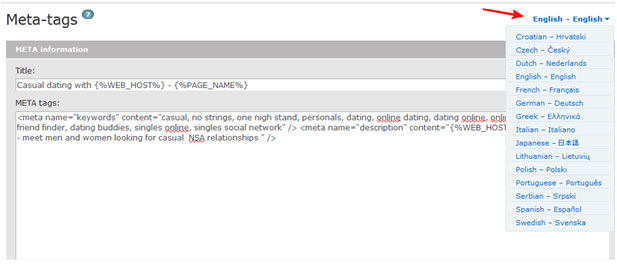
- Avoid unnatural links e.g. participation in link exchange programs, traffic exchanges, etc. You can be at high risk if you are paying to buy back-links. Google Webmaster Guidelines are always against link schemes and you should only get quality links from relevant websites.
- Don’t copy from other sources (even from yours), as you will not be able to get high rank with unoriginal content.
- Avoid hidden text and links, those used for special purpose for search engines only.
- Cloaking: This black hat SEO technique is outdated and you can’t trick search engine users by showing different content or URLs to what they see on search engines.
And last, but not the least: you should definitely check the Google Blacklist – Words That Google Doesn’t Like.
Happy SEO-ing!